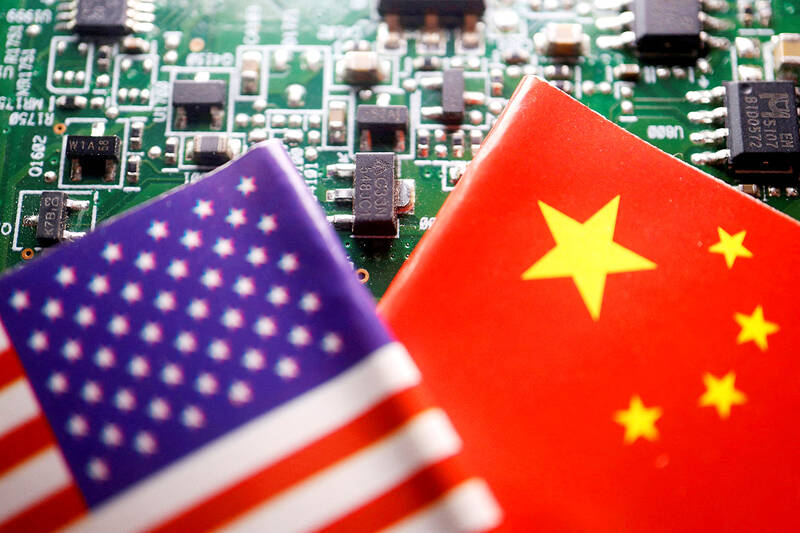US President Donald Trump’s administration is sketching out tougher versions of US semiconductor curbs and pressuring key allies to escalate their restrictions on China’s chip industry, an early indication the new US president plans to expand efforts that began under former US president Joe Biden to limit Beijing’s technological prowess.
Trump officials recently met with their Japanese and Dutch counterparts about restricting Tokyo Electron Ltd and ASML Holding NV engineers from maintaining semiconductor gear in China, people familiar with the matter said.
The aim, which was also a priority for Biden, is to see key allies match China curbs the US has placed on US chip gear companies, including Lam Research Corp, KLA Corp and Applied Materials Inc.

Photo: Reuters
In Beijing, the Chinese Ministry of Foreign Affairs yesterday said that the US plan of coercing other countries into going after China’s semiconductor industry would backfire.
Such actions by the US would hinder development of the global semiconductor industry, ministry spokesman Lin Jian (林劍) told a regular press briefing.
The Trump team’s meetings come in addition to early discussions in Washington about sanctions on specific Chinese companies, other people said.
Some Trump officials also aim to further restrict the type of Nvidia Corp chips that can be exported to China without a license.
They are also having early conversations about tightening existing curbs on the quantity of artificial intelligence (AI) chips that can be exported globally without a license, some of the people said.
It could take months before the talks produce any new US regulations, as Trump makes staffing decisions at key federal agencies. It also remains to be seen whether allies would be more receptive to the new leadership in Washington.
Some officials on the US National Security Council are considering blocking Chinese memory chipmaker ChangXin Memory Technologies Inc (長鑫存儲) from buying US technology, while others also want to intensify restrictions on Semiconductor Manufacturing International Corp (中芯國際), the main chipmaking partner of Chinese telecom giant Huawei Technologies Co (華為).
Then there is the so-called AI diffusion rule, imposed in the final week of Biden’s term. The measure divided the world into three tiers of countries and set maximum thresholds for the AI computing power that can be shipped to each. It also established mechanisms for companies to validate the security of their projects and access higher compute limits.
The rule, which would impact data center developments everywhere from Southeast Asia to the Middle East, drew harsh rebuke from companies including Nvidia. The White House is discussing how to streamline and strengthen that framework, several people familiar with the conversations said, although what that entails is still in flux.
One idea favored by some in the administration would be to reduce the computing power that can be exported without a license. Under current restrictions, chipmakers only have to notify the government before exporting the equivalent of as many as 1,700 graphic processing units (GPUs) to most countries.
Some Trump officials want to reduce that threshold, people familiar with the matter said, which would expand the scope of the license requirement.
Additional reporting by Reuters

Sweeping policy changes under US Secretary of Health and Human Services Robert F. Kennedy Jr are having a chilling effect on vaccine makers as anti-vaccine rhetoric has turned into concrete changes in inoculation schedules and recommendations, investors and executives said. The administration of US President Donald Trump has in the past year upended vaccine recommendations, with the country last month ending its longstanding guidance that all children receive inoculations against flu, hepatitis A and other diseases. The unprecedented changes have led to diminished vaccine usage, hurt the investment case for some biotechs, and created a drag that would likely dent revenues and

Macronix International Co (旺宏), the world’s biggest NOR flash memory supplier, yesterday said it would spend NT$22 billion (US$699.1 million) on capacity expansion this year to increase its production of mid-to-low-density memory chips as the world’s major memorychip suppliers are phasing out the market. The company said its planned capital expenditures are about 11 times higher than the NT$1.8 billion it spent on new facilities and equipment last year. A majority of this year’s outlay would be allocated to step up capacity of multi-level cell (MLC) NAND flash memory chips, which are used in embedded multimedia cards (eMMC), a managed

CULPRITS: Factors that affected the slip included falling global crude oil prices, wait-and-see consumer attitudes due to US tariffs and a different Lunar New Year holiday schedule Taiwan’s retail sales ended a nine-year growth streak last year, slipping 0.2 percent from a year earlier as uncertainty over US tariff policies affected demand for durable goods, data released on Friday by the Ministry of Economic Affairs showed. Last year’s retail sales totaled NT$4.84 trillion (US$153.27 billion), down about NT$9.5 billion, or 0.2 percent, from 2024. Despite the decline, the figure was still the second-highest annual sales total on record. Ministry statistics department deputy head Chen Yu-fang (陳玉芳) said sales of cars, motorcycles and related products, which accounted for 17.4 percent of total retail rales last year, fell NT$68.1 billion, or

In the wake of strong global demand for AI applications, Taiwan’s export-oriented economy accelerated with the composite index of economic indicators flashing the first “red” light in December for one year, indicating the economy is in booming mode, the National Development Council (NDC) said yesterday. Moreover, the index of leading indicators, which gauges the potential state of the economy over the next six months, also moved higher in December amid growing optimism over the outlook, the NDC said. In December, the index of economic indicators rose one point from a month earlier to 38, at the lower end of the “red” light.